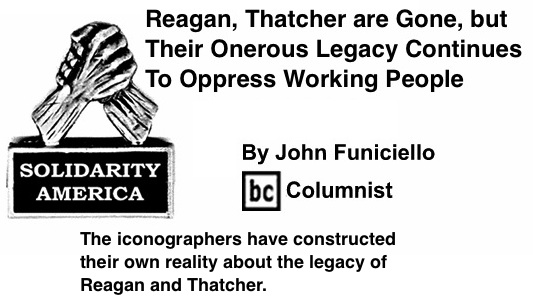


Although both U.S.
President Ronald Reagan and British Prime Minister Margaret Thatcher are dead,
the legacy they left their countries is evident to this day, as the House of
Commons in England debates the abolition of the Agricultural Wages Board (AWB),
which sets minimum wages and conditions for farm and agricultural workers in
both England and Wales.
The move by the Parliament
has been in the works for some time, the House of Lords having voted for
abolition already. Those on the left and unions have declared that the move to
eliminate the board is a “dismantling of agricultural workers’ rights.” Thatcher,
who died recently, and Reagan, ideological soul mates that they were, would be
pleased that the move against the board is even being considered, let alone on
the brink of being accomplished.
During her tenure as prime
minister, Thatcher saved her special vitriol for the unions and their members,
terming them “the enemy within,” probably one of the more vicious slurs ever
against British citizens, who did some of the toughest and dirtiest work of the
society and who just wanted the right to be represented by unions of their
choice and to live life at a decent standard. She not only destroyed their
unions, but, in the case of the coal pits, she wiped out the very means of
community survival by closing the mines. Environmentally, the closing of the
mines ultimately might have been a step closer to improving the air quality of
parts of
Reagan opened his two
terms as U.S. president by firing the striking members of the Professional Air
Traffic Controllers Organization (PATCO), which was one of only two unions that
endorsed him for president (the other was the Teamsters), because as a
candidate, he promised them he would look into the dangerous conditions in the
towers of airports across that country. He didn’t. They struck out of
desperation, and he fired them and blacklisted them from any future federal
jobs.
The animus against unions
was mostly complete in the
Anyone who thinks
otherwise just needs to recall last year’s Republican primary campaign, in
which right wing candidates for the presidential nomination tried to outdo each
other in their attacks on workers, their unions, social programs, and on
government, itself. Not one of them made a move in the direction of reining in
the flagrant violation of
Thatcher and Reagan also
had difficulty relating to workers and that attitude, over a period of years,
eventually encompassed much, if not most, of the middle class, however much of
that class remains. Charts drawn up by any number of economists and economic
think tanks show the alarming disparity between the rich 1 percent and the
remaining 99 percent of Americans. This is what both Thatcher and Reagan strove
for, as did Mulroney, as a kind of acolyte of their “lay low the working class
and their unions” method of operation.
Even though a close
examination of the philosophy of the
The Labour
Party, under Prime Minister Tony Blair, followed
But the “victory” in the
Thatcher was the woman who famously said, “there is no society,” but only individuals, meaning that the nation need not worry about taking care of the least among us, but watch out only for oneself. In that, both she and Reagan were opting for much less government, a government that would be so small that it would not be able to manage any programs for the poor, even as they showered the corporations and the rich with low tax rates, subsidies, grants, and extremely weak laws to hold the elites responsible for the loss of tax revenues when they sheltered their riches in tax havens around the world. So much for evenhandedness in tax policies and distribution of a nation’s largesse.
In some of her utterances,
she virtually predicted the onslaught against government in both countries by
the 1 percent and their minions in Congress and the state legislatures, in
keeping with (mostly) GOP candidates who expressed their beliefs in the
philosophy of selfishness of Ayn Rand, a darling of
the right and mentor of such luminaries as former Federal Reserve Chairman Alan
Greenspan. The era of greed, which both Thatcher and Reagan incorporated into
their governance, wittingly or unwittingly, sails on to this day, much to the
detriment of all of the citizens of their countries, right into an economic
crisis that may not be able to be turned from disaster.
The abolishment of the AWB
in
Unite, the union, stated: “The
AWB not only helps ensure rural wages progress towards a living wage, it also
benefits employers. The vast majority of farmers - some 75 percent Unite talked
to - do not want to be charged with undertaking wage bargaining. They are
heavily dependent on their employees and do not want the tension that comes
with imposing wage deals. The workers can often be tenants of their employers
too, and so will become incredibly vulnerable if the AWB is removed. For the
workers and farmers alike, the AWB provides ‘neutral ground’ which both parties
value.”
What the right wing in the
Even if the House of
Commons rejects elimination of the AWB, it is just part of the everyday
campaign against the rights of workers and the Brits have a long way to go to
equal the assault on workers and their unions in the U.S. Union membership
numbers tell that story in a nutshell. Billions of dollars have been spent over
a few decades by Corporate America to eradicate the very idea of unions in
The
followers of Reagan (even though much of his “legacy” is myth and illusion) and
Thatcher largely see the world as “not a society,” but a world of individuals
who should only be concerned with their own welfare. The GOP candidates at state and federal levels
have expressed no less than that Randian philosophy
in campaigns across the country. It is more than mere ideology, however. Rather,
it is simply because a nation, filled with individuals looking out for their
own interests, is easily controlled by the powerful elite.
They want the people to
forget that in solidarity and unity there is great strength.

BlackCommentator.com Columnist, John Funiciello,
is a long-time former newspaper reporter and labor organizer, who lives
in the
 |






